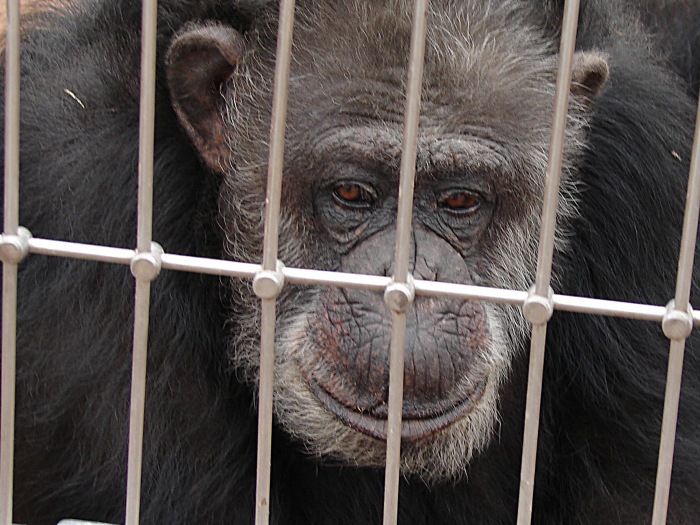Catastrophic Conditions in German Zoos
Animal rights activists aim to include basic rights for great apes in the German constitution

badpyrm3.jpg
Photo: Colin Goldner
60 percent of German zoos keeping apes do not meet the minimum requirements set out in the new mammal expert opinion issued by the Federal Ministry of Food and Agriculture. This was explained by Colin Goldner, head of the "Great Ape Project Germany" (GAP), at a press conference in Berlin on Thursday morning. Many chimpanzees, bonobos, gorillas and orang-utans show, as Goldner documents in his recently published book "Lebenslänglich hinter Gittern" ("Life behind bars"), symptoms of massive psychological disturbances and can only survive the equally dull as stressful everyday life at the zoo with the help of psychopharmaceuticals.
As long as great apes are regarded as "property" that can be exploited, sold and killed, only little will change about these conditions. For this reason, the initiative "Grundrechte für Menschenaffen" ("Basic Rights for Apes"), which is supported by various animal rights and animal protection associations, demands that chimpanzees, bonobos, gorillas and orangutans be recognised as legal entities and that their basic rights be protected. Philosopher Michael Schmidt-Salomon, who coordinates the initiative as spokesman of the Giordano Bruno Stiftung (gbs), recently submitted a corresponding petition (petition number 51830) to the Petitions Committee of the German Bundestag.
At the press conference in the House of the Federal Press Conference, renowned experts explained why great apes are to be regarded as persons who should have a right to life, freedom and physical integrity. Dieter Birnbacher, chairman of the Central Ethics Commission of the German Medical Association, explained why it is ethically impermissible to discriminate against individuals solely on the basis of their species, while lawyer Eisenhart von Loeper explained why the personal rights of great apes should be included in Article 20a of the German Basic Law. "The bare reference to the animal protection in this Basic Law article is by no means sufficient for the acknowledgment of the great apes' interests", explained von Loeper. The long-term chairman of the federal association "Menschen für Tierrechte" ("Humans for Animal Rights") knows more about this matter than almost anyone else. After all, Loeper was significantly involved in ensuring that animal protection was incorporated into the Basic Law in 2002.
"It took many years until animal protection in Germany received constitutional status. This will hardly be any different in the enforcement of basic rights for great apes," said gbs spokesman Schmidt-Salomon, who moderated the press conference in Berlin. However, improvements of the housing conditions in zoos should be made as quickly as possible, especially in institutions that do not even meet the minimum requirements of the new mammalian expert opinion, despite their far short falling of the guidelines in other countries, as Laura Zimprich, chairwoman of the animal public association, explained at the press conference.
According to GAP director Colin Goldner, particularly catastrophic housing conditions currently prevail in the zoos Bad Pyrmont, Delbrück, Duisburg, Dresden, Gettorf, Schwaigern, Welzheim and Wuppertal. In 15 other zoos, the minimum requirements of the mammalian expert opinion are not fulfilled either. "This means that 23 out of 38 zoos in Germany fall short of the already modest requirements of the Federal Ministry of Food and Agriculture," said Goldner. "This is a scandal that, for animal ethical reasons, in the interest of our hairy relatives, we must no longer tolerate."
Link recommendations for this message:
"Life behind bars" - The press conference video clip:
http://www.youtube.com/watch?v=Sqn2DawGkZY
The "Digital Press Kit" for the press conference can be found under:
/meldung/pressekonferenz-grundrechte-fuer-menschenaffen-lebenslaenglich-hinter-gittern
Press contact:
- Dr. Colin Goldner (Great Ape Project), mail: info(at)greatapeproject.de, Internet: www.greatapeproject.de
- Dipl.-Psych. Elke Held (Giordano Bruno Stiftung), mail: presse(at)giordano-bruno-stiftung.de, Internet: www.giordano-bruno-stiftung.de
- Margarete Schwind (Schwindkommunikation Berlin), mail: ms(at)schwindkommunikation.de
